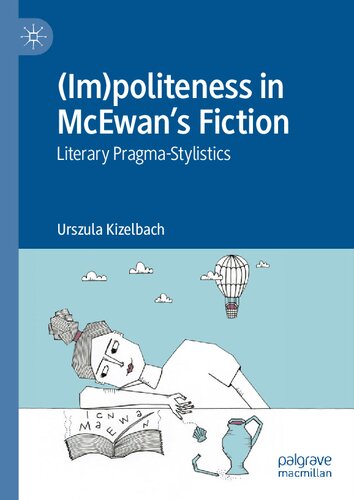(Im)politeness in McEwan’s Fiction: Literary Pragma-Stylistics First Puplished Edition Urszula Kizelbach
$50.00 Original price was: $50.00.$25.00Current price is: $25.00.
(Im)politeness in McEwan’s Fiction: Literary Pragma-Stylistics Urszula Kizelbach – Ebook Instant Download/Delivery ISBN(s): 9783031186899,9783031186905,3031186893,3031186907
Product details:
- ISBN 10: 3031186907
- ISBN 13:9783031186905
- Author: Urszula Kizelbach
This book is a pragma-stylistic study of Ian McEwan’s fiction, providing a qualitative analysis of his selected novels using (im)politeness theory. (Im)politeness is investigated on two levels of analysis: the level of the plot and the story world (intradiegetic level) and the level of the communication between the implied author and implied reader in fiction (extradiegetic level). The pragmatic theory of (im)politeness serves the aim of internal characterisation and helps readers to better understand and explain the characters’ motivations and actions, based on the stylistic analysis of their speech and thoughts and point of view. More importantly, the book introduces the notion of “the impoliteness of the literary fiction” – a state of affairs where the implied author (or narrator) expresses their impolite beliefs to the reader through the text, which has face-threatening consequences for the audience, e.g. moral shock or disgust, dissociation from the protagonist, feeling hurt or‘put out’. Extradiegetic impoliteness, one of the key characteristics of McEwan’s fiction, offers an alternative to the literary concept of “a secret communion of the author and reader” (Booth 1961), describing an ideal connection, or good rapport, between these two participants of fictional communication. This book aims to unite literary scholars and linguists in the debate on the benefits of combining pragmatics and stylistics in literary analysis, and it will be of interest to a wide audience in both fields.
Table contents:
1. Why Ian McEwan and Literary Pragma-Stylistics?
2. Pragmatics and the Analysis of Fiction
3. Narrative Tradition in Fiction: A Pragma-Stylistic Approach
4. Intradiegetic (Im)politeness or How the (Im)politeness Theory Is Used for Internal Characterisation
5. Extradiegetic (Im)politeness or How the Implied Author Communicates with the Reader
6. Conclusion
People also search:
(im)politeness in mcewan’s fiction
novelist mcewan
feminism in atonement
novelist ian mcewan
ian mcewan politics
You may also like…
Linguistics - Stylistics
English Stylistics: A Cognitive Grammar Approach Zeki Hamawand
Business & Economics
Televising Restoration Spain: History and Fiction in Twenty-First-Century Costume Dramas 1st Edition
Others
The Romantic Literary Lecture in Britain 1st edition by Sarah Zimmerman 0192569561 9780192569561
Politics & Philosophy - Social Sciences
Reference - Writing
Politics & Philosophy - Women's Studies













